Posts Tagged ‘Writers in Prison Committee’
PEN Journey 10: WiPC: Beware of Principles
PEN International celebrates its Centenary in 2021. I’ve been active in PEN for more than 30 years in various positions and now as an International Vice President Emeritus. With memories stirring and file drawers of documents and correspondence bulging, I am a bit of a walking archive and have been asked by PEN International to write down memories. I hope this personal PEN journey might be of interest.
In the summer of 1993 before taking over the Chair of PEN International’s Writers in Prison Committee I studied hundreds of individual cases on PEN’s list of over 900 cases which was published twice a year. I studied the regions of the world where conflict was rife, where governments were most oppressive and where writers were most threatened. I also used the time to conceive three long term projects because I knew when the job began, there would be less time for long term thinking.
First, I hoped we could gather the many poems and stories from imprisoned writers over the years and get these published into a book. In studying the cases, I came to understand that those who survived harrowing experiences were often those able to keep their imaginations alive and if possible were able to write. “We lived in Paris in our minds,” one prisoner in dire conditions inside the Western Sahara recounted. A book of these writings would celebrate and inspire and could also be used by PEN centers in their work.
Second, I wanted to convene the Writers in Prison Committees from around the world in a conference to strategize our work. PEN’s other standing committees had such meetings outside of the congresses, but WiPC never had. The PEN congresses were often filled with competing programs and those working on WiPC issues were not always the delegates. We needed to gather and plan together for several days.
Finally, I hoped to expand the roster of Writers in Prison Committees in the PEN Centers so that we could increase the number of members working and the number of writers on whose behalf we worked.
WiPC Coordinator Sara Whyatt and researcher Mandy Garner and I agreed on each of these goals. Every two weeks we met in the large airy WiPC office at the top of the Charterhouse Buildings in London or often at the tea shop across the alley. At the end of our strategy sessions we would discuss how to move forward the longer range goals. I learned an important lesson—first, a goal begins with an idea then is realized by having talented, committed people around. For me that began with Sara and Mandy, who set steps in motion. And then each project found a path forward as people arrived into our circle to help accomplish the tasks.
One day a publisher showed up in our office and asked if we had ever considered doing a book of prisoners’ writings. As a matter of fact…We quickly outlined our idea, put together a team with former WiPC coordinator Siobhan Dowd as editor, and a year and a half later in 1996 This Prison Where I Live was on book stands with selections from more than 65 writers who had been imprisoned, many of whose cases PEN had worked on, from Arthur Koestler to Cesar Vallejo, Alexander Solzhenitsyn, Jacobo Timerman, Breyten Breytenbach, Pramoedya Ananta Toer, Primo Levi, Wole Soyinka, Vaclav Havel, Ngugi wa Thiong’o, Nazim Hikmet, Ken Saro-Wiwa, and many others, current and former writers in prison.
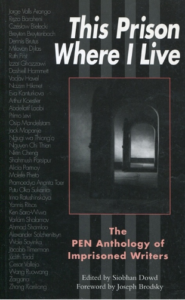
From This Prison Where I Live:
You took away all the oceans and all the room.
You gave me my shoe-size with bars around it.
Where did it get you? Nowhere.
You left me my lips, and they shape words, even in silence.
—Osip Mandelstam, former USSR, 1935
When we shared our second hope for a global gathering, Danish PEN offered to host the conference in Helsingor, the home of Hamlet. With representatives of PEN centers on every continent, this first WiPC conference convened in the spring of 1996. The WiPC gathering has been held biennially ever since at locations around the world. (More on this conference in a later post.)
Regarding the third goal, the number of PEN centers with Writers in Prison Committees has grown each year because of PEN members around the globe. Unfortunately, the number of cases of writers threatened, imprisoned or killed has also continued to grow, but individual cases are released.
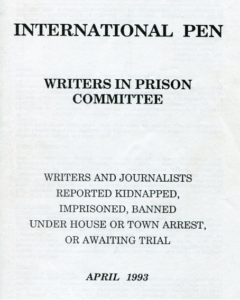
In that summer preparing to take over the Chair, my predecessor and mentor Thomas von Vegesack gave me advice I found puzzling at first. He invoked: “Beware of principles!” Thomas was an empathetic and principled man so I was perplexed by his counsel, but over the years I’ve come to understand what he meant. He meant that declarations and statements can often keep you from seeing a way forward and from understanding how to work on a case if you get tangled in abstractions.
There are of course principles that govern our work enshrined in the Universal Declaration of Human Rights. These are fundamental, but Thomas was warning that it is important to understand each situation and not let rigidity, a kind of authoritarianism of principles or political correctness limit.
PEN’s Charter itself contains contradictory concepts. The Charter asserts that PEN members should “use what influence they have in favour of good understanding and mutual respect between nations and people; they pledge themselves to do their utmost to dispel all hatreds and to champion the ideal of one humanity living in peace and equality in one world.”
At the same time the Charter notes that “PEN stands for the principle of unhampered transmission of thought within each nation and between all nations, and members pledge themselves to oppose any form of suppression of freedom of expression in the country and community to which they belong…”
These two ideas of respect and freedom of expression have been challenged more than once, a decade ago in the case of the Danish cartoons. (More on this in a future post.)
Ultimately each PEN member has to resolve the inherent tension. Those from societies with longer democratic traditions are more accustomed to balancing competing ideas; but there are no certain answers. PEN has had lengthy discussions and debates on such questions as “hate speech”—what constitutes it, are there limits to freedom of expression—on slander and libel, holocaust denial, blasphemy.
These challenges for PEN are manifested in individual cases. Early in my tenure as Writers in Prison Chair, one such case blew up quickly, gathering headlines across the globe—the case of Bangladeshi writer Taslima Nasrin. Dr. Nasrin (she was a medical doctor turned writer) had written a novel Lajja (Shame) which described the Muslim backlash against Bangladesh’s Hindu minority after the destruction of a mosque. She was also quoted (misquoted, she said) suggesting that the Koran should be revised in favor of women. An arrest warrant was issued for her; demonstrators called for her death, and at one point snake charmers in Dhaka threatened to release their cobras into the streets if she wasn’t executed. PEN’s Writers in Prison Committee and PEN’s Women’s Committee took up the case, which had bizarre twists along the way.
Next Installment: PEN Journey 11: Death and Its Threat: The Ultimate Censor
PEN Journey 8: Thresholds of Change…Passing the Torch
PEN International celebrates its Centenary in 2021. I’ve been active in PEN for more than 30 years in various positions and now as an International Vice President Emeritus. With memories stirring and file drawers of documents and correspondence bulging, I am a bit of a walking archive and have been asked by PEN International to write down memories. I hope this personal PEN journey might be of interest.
In fall, 1991 I went to Moscow just months after the August coup attempt in which hardline Communists sought to take control from President Mikhail Gorbachev. I hopped onto the visa of my husband who was traveling to Russia as a Visiting Scholar at the International Institute of Strategic Studies in London. I went as a writer, interested in meeting other writers. I contacted fellow PEN member and Russian translator Michael Scammell, who had previously chaired International PEN’s Writers in Prison Committee (WiPC). Michael gave me a list of writers to contact in Moscow.
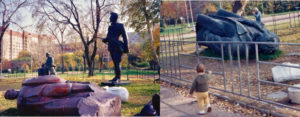
Statues toppled of Lenin and Stalin and others in park after failed coup attempt in Moscow, 1991.
My husband and I stayed in what I was told was one of the government hotels where guests were hosted but also watched. We were watched too, I’m fairly certain, though there was little for anyone to see with me. I was cautious as I made contact with the writers lest my reaching out compromise them. Only a few years before, PEN’s case list had included many dissident Soviet writers in prison. Michael and later WiPC Chair Thomas von Vegesack and PEN’s WiPC committees around the world had advocated for the release of dissident Soviet writers, many of whom were imprisoned in the gulags. PEN had also covertly sent aid to them and their families through the channels of the PEN Emergency Fund.
I no longer remember if I called or faxed the writers in advance. (Fall, 1991 was before an active internet.) I likely made contact when I arrived. The writers welcomed me. We met in simple apartments with old holiday cards on the mantles as decorations, a paper mobile hanging from the light fixture over one dining room table I recall, strips of newspaper stacked by the toilets in lieu of tissue. The economy was spare for these writers. They hoped for change and for freedoms to come, but they were cautious. In these meetings and in other random encounters, people were curious about the United States. On the street, vendors not only sold Russian nesting dolls with the rushed visages of Boris Yeltsin, who had defied the tanks of the coup, and of Gorbachev but also stacking dolls of U.S. presidents, including one set that had George Washington and Abraham Lincoln. I was asked by numbers of people, including the writers, if I could get them copies of the U.S. Constitution and the Federalist papers. The Berlin Wall had fallen and times were changing, but no one knew how that change would settle out in the Soviet Union.
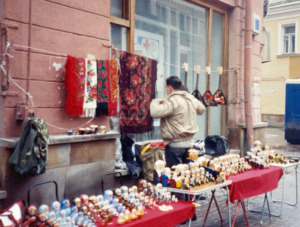
Stall of street vendor selling Russian Matryoshika dolls, including stacking dolls of Boris Yeltsin and Mikhail Gorbachev and also U.S. Presidents.
I remember one meeting in Moscow with members of a women’s theater cooperative—actresses, director, costume designer, and playwright. Before the member who spoke English arrived, we were left to communicate with each other by hand gestures and a few common words. Finally, the sturdy, broad-chested Russian writer who spoke English entered. I asked her what she did during the coup attempt. She stood, spread out her arms and declared triumphantly, “I stopped the tanks with my breasts!” This image has stayed with me, along with her words and the determined words of her fellow thespians and writers in that apartment, women demanding as their due freedoms they hadn’t yet experienced.

Joanne and members of Russian women’s theater cooperative in Moscow apartment, 1991.
Not only in the USSR but elsewhere, old dictatorships were crumbling, in Africa and Latin America. PEN was a refuge writers often looked to before democracy and political liberalization took hold in their countries. In September 1991 at the Vienna Congress, a month after the coup attempt, the Soviet Russian Center applied and received approval to change its name to Russian PEN. The debate within PEN was when to recognize a center. It was necessary to have enough qualified writers committed to the freedoms embedded in the PEN Charter and to have an environment in which the writers could feasibly operate, at least to some extent.
As the USSR broke apart, writers gathered and petitioned for PEN centers, sometimes before the regions claimed full independence. A PEN Center of the Soviet Asian Republics, including the literatures of the five separate regions of Kazakhstan, Uzbekistan, Turkmenistan, Kyrgyzstan and Tadzhikistan had been recognized at the Paris gathering in April 1991, but by PEN’s September 1993 Congress in Santiago de Compostela, Spain, writers from Kazakhstan, Kyrgyzstan and Turkmenistan all proposed separate centers of PEN. Russian PEN supported the disbanding of the Soviet Central Asian Center because it had not functioned, because the Soviet Union no longer existed, and because the President of the center had made public statements racially slandering others, and he refused to withdraw these. It is rare for PEN to challenge a member and withdraw membership, but the use of PEN to advocate racially intolerant and provocative positions is a rationale; PEN did so as well with certain members in the Balkans during the war there.
The Kazakhstan Center was accepted as a PEN Center at the Congress in 1993; the vote on Kyrgyzstan’s proposal was delayed until more information about the writers could be gathered, and it was agreed the situation in Turkmenistan, still governed by a dictatorship, remained too problematic for a PEN center to exist.
PEN often mirrored the global landscape. In the early 1990’s PEN added centers in Albania, Azerbaijan, Georgia, Kazakhstan, Moldova, Mongolia, Montenegro, Bosnia, and an ex-Yugoslav Center for writers in exile from the former Yugoslavia. Also new centers formed in the Congo, Mozambique, Malawi, Kenya, Guadalajara, Palestine as well as a Chinese Writers Abroad Center, an Iranian Writers in Exile Center, and an African Writers Abroad Center. The abroad and exile centers included members living outside the regions. At the Barcelona Congress in 1992 the acceptance of a Palestinian PEN Center was unanimous, including by the Israeli PEN and represented a hope that writers in the region would engage with each other. Also a Welsh Center and an Esperanto Center were added in the early 1990s.
PEN was growing quickly. It doubled in size in ten years, from 50 centers to more than 100 centers in 1992. Its finances, however, did not grow at the same rate, and the governing structure was essentially the same—an elected President, International Secretary and Treasurer who comprised the executive of International PEN. Staff also had hardly grown. Elizabeth Paterson, the Administrative Secretary had to manage the increasing workload with the addition of Jane Spender as her assistant. The Writers in Prison Committee, which operated with a separate budget, in a separate room, consisted of only two researchers—Sara Whyatt ,coordinator, and Mandy Garner and later a few interns.
During Michael Scammell’s years as Chair of WiPC and later during Thomas von Vegesack’s term, the Writers in Prison Committee focused its work on behalf of imprisoned and threatened writers, and on occasion tension arose between the Secretariat’s goal of promoting literature and comity among writers and the WiPC’s goal of protecting writers in oppressive regimes. The ultimate organizational decisions fell to the Secretariat between Congresses and in consultation with the Assembly of Delegates which met twice a year at Congress. Because of budgetary restraints and the growing size and expense of the Congresses, PEN reduced its Congresses to only once a year, beginning in 1994.
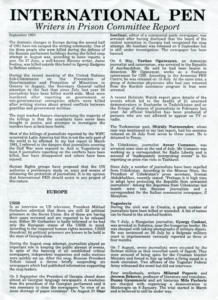
PEN International’s Writers in Prison Committee Report, September 1991 presented to the November 1991 PEN Congress in Vienna. PEN’s complete Case List for this period included 143 pages of cases of writers and journalists around the world reported kidnapped, “disappeared,” executed, having died in custody, imprisoned, banned, under house or town arrest, deported or awaiting trial.
Controversy around the narrow base of decision-making came to a confrontation over the April 1993 Congress in Dubrovnik, Croatia. The Balkan War was raging. At the Rio Congress in December 1992 the American delegate questioned the wisdom of holding the Congress in a war zone not only for reasons of safety but also for the appearance and possible “political misuse” of PEN in one corridor of the riven community and the restrictions on talking freely with the press. Others felt holding the Congress, most of which would be on a ship that would sail from Venice to Dubrovnik, would have a symbolic message of peace and also commemorate PEN’s Dubrovnik Congress 60 years earlier in 1933 when PEN exlcuded official writers of Nazi Germany from the organization. The host center assured that all centers from the region would attend. When delegates asked that the Dubrovnik Congress either be cancelled or postponed, they were told the decision had been made two years before, and there was no need for the Assembly to take a vote. Later as the war escalated, a mail vote was taken and the majority who responded voted for postponement, but the Croatian center, which had put in considerable work, wanted to hold the Congress, and so the plans went ahead.
On April 12, a week before the PEN gathering, the Army of the Republic of Srpska launched an attack on the town of Srebrenica in Bosnia, 200 miles from Dubrovnik. Many PEN Centers chose not to send delegates, including American and German PEN. The Writers in Prison Committee in the person of Thomas also chose not to attend nor did many of the WiPC members. Because there was not a quorum, the gathering was declared not an official congress, but a meeting.
I did not attend either the Dubrovnik meeting nor the earlier Rio Congress. Before the November 1992 Congress in Rio, Thomas and International Secretary Alexander Blokh without consulting with each other asked if I would take over the Chair of the Writers in Prison Committee when Thomas finished his term in September 1993. The fact that these two individuals both came to me made me consider carefully, but I was among the younger generation of PEN members who was urging more democratic procedures for PEN. I didn’t think the Chair should be an appointive office but should have the input of the PEN members, but in 1992, PEN had no such systems in place. Alex told me that he would canvas people at the Rio Congress to see if they agreed and get back to me. I don’t know what process was used nor how widely he asked, but he and Thomas returned in agreement and urged me to accept. I agreed, though I said that when my term was up, I wanted to assure we had set in place a more democratic system for nominations and election of the WIPC Chair. And so we did and have ever since.
Next Installment: PEN Journey 9: The Fraught Roads of Literature
PEN Journey 4: Freedom on the Move: West to East
PEN International celebrates its Centenary in 2021. I’ve been active in PEN for more than 30 years in various positions. With memories stirring and file drawers bulging, I am a bit of a walking archive and have been asked by PEN International to write down memories. I hope this personal PEN journey will be of interest.
I have attended 32 International PEN Congresses as president of a PEN Center, often as a delegate, as Chair of the International Writers in Prison Committee, as International Secretary and now as Vice President. The number surprises me when I count. The Congresses have been held on every continent except Antarctica. Many were grand affairs where heads of State such as Vaclav Havel in Czechoslovakia, Angela Merkel in Germany, Abdoulaye Wade in Senegal greeted PEN members. Some were modest as the improvised Congress in London in 2001 when PEN had to postpone the Congress planned in Macedonia because of war in the Balkans. PEN held its Congress in Ohrid, Macedonia the following year. At these Congresses writers from PEN centers all over the globe attended. Today PEN International has centers in over 100 countries.
Among the more memorable and grand was the 54th PEN Congress in Canada, held in September 1989 when PEN still held two Congresses a year. The Canadian Congress, staged in both Toronto and Montreal by the two Canadian PEN centers, moved delegates and participants between cities on a train. The theme—The Writer: Freedom and Power—signaled hope at a time when freedom was expanding in the world with writers wielding the megaphone.
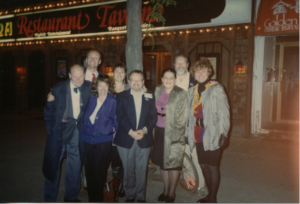
54th PEN Congress in Canada, 1989. Front row: WiPC chair Thomas von Vegesack, Joanne Leedom-Ackerman and PEN USA West Executive Director Richard Bray. Back row: Digby Diehl (right) and other delegates.
The literary programs included luminary writers from over 25 countries, including Margaret Atwood (Canada), Chinua Achebe (Nigeria), Anita Desai (India), Tadeusz Konwicki ( Poland), Claribel Alegria (El Salvador), Margaret Drabble (England), Michael Ignatieff (Canada), Ama Ata Aidoo (Ghana), Derek Walcott (St. Lucia), John Ralston Saul (Canada), Duo Duo (China), Harold Pinter (England), Tatyana Tolstaya (USSR), Alice Munro (Canada), Wendy Law-Yone (Burma), Larry McMurtry (USA), Emily Nasrallah (Lebanon), Yehuda Amichai (Israel), Maxine Hong-Kingston (USA), Michael Ondaatje (Canada), Nancy Morejn (Cuba), Jelila Hafsia (Tunisia), Miriam Tlali (South /Africa), and dozens more, and other writers listed in absentia such as Vaclav Havel (Czechoslovakia) and writers from Iran, Turkey, Hungary, South Africa, Morocco and Vietnam. PEN members and delegates attended from at least 57 PEN centers around the world.
The new PEN International President Rene Tavernier, a poet who had been active in the French resistance during World War II, hailed the importance of the writer’s role in upholding freedom of expression around the globe and in confronting central power which restricted individual voices. PEN’s and the writer’s only weapon was the word, he said, and the word must be used in service of “creative intelligence, human rights, lucidity and hope.” Though the twentieth century had seen “the growth of new and atrocious ideologies with their police forces and concentration camps, they could not change the spirit of man, which is what PEN defends,” he said. PEN’s concern was literature and ideas and conversations among writers, who may not always agree.
A goal of the Congress was to expand dialogues among people, especially in Muslim communities in the wake of the fatwa and to expand PEN’s reach into Africa, the Middle East and Latin America. Today PEN centers in those areas have grown exponentially with 33 centers in Africa and the Middle East and 19 centers in Latin America, though participation from these centers in global forums still remains challenging.
Another outcome of the Congress was the formation of the PEN Women’s Network, a precursor to the Women’s Committee established as a standing committee of PEN two years later at the 1991 Vienna Congress. The Canadian Congress organizers had balanced literary panels and discussions among men and women, a response to the growing voice of women in PEN and to the 1986 New York Congress where men dominated the forums. Some opposed a Women’s Committee, including English PEN which voiced concern that it would fragment and divide members when the goal of PEN was to bring people together. English PEN already operated under a guideline that balanced men and women in leadership. PEN International Vice President Nadine Gordimer wrote that she had “more pressing obligations here, at home in South Africa, towards the needs of both women and men who are writers under our difficult and demanding position, beset by censorship, harassment, and lack of educational opportunities common to both sexes.” But she added that she hoped if a committee did form, it would be in touch with all South African writers.
PEN USA West presented a resolution on South Africa at the Congress, protesting the arrest and treatment of a number of writers, including our honorary member. The resolution passed unanimously in the Assembly of Delegates.
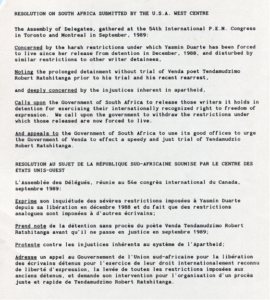
My fellow delegate and I also joined American PEN as well as Canadian PEN, Hong Kong and Taipei PEN in a resolution protesting the “slaughter of Chinese citizens peacefully assembled in and around Beijing’s Tiananmen Square” three months before and the arrest of writers, including Liu Xiaobo and over 20 others. It was feared some of the China PEN members might be under threat. Neither the China Center nor the Shanghai Center were present at the Canadian Congress, but they had been in touch with PEN International. In an official communication the Shanghai Center protested that China was being slandered abroad. Representatives from the two Chinese Centers had demanded an apology from PEN International because poet Bei Dao had been allowed to address the Maastricht Congress (see PEN Journey 3) and they continued to argue that PEN’s main case Wei Jingsheng was not a writer. An apology was not offered, and the resolution protesting the killings and arrests after Tiananmen Square passed with one abstention. Delegates from the China Center and Shanghai Center didn’t return to a PEN Congress for the next two decades, but in the intervening years, individual centers and members such as Japanese writers stayed in touch. In 2001 an Independent Chinese PEN Center (ICPC) formed and gave a place for Chinese writers inside and outside of China to communicate with discussion and debate on freedom of expression and democracy. PEN currently has more than half a dozen centers of Chinese writers, including the China, Shanghai, ICPC, Taipei, Hong Kong, Tibet, Uyghur, and Chinese Writers Abroad centers.
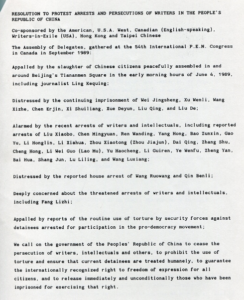
The challenge for PEN has always been how best to use its formal resolutions, written in the language of the United Nations. These are passed then directed to the respective governments, to United Nations forums and to embassies and officials in the countries where PEN has centers and to the media. The effort begins at the PEN International office and then fans out through the centers. The impact of the resolutions vary according to country and to the direct advocacy efforts. However, the climate for such resolutions has altered over the years, and it is an ongoing question what is the most impactful method for effecting change.
At the Canadian Congress the situation in Myanmar/Burma was also highlighted. Our center, along with Austrian, Australian (Perth), and Canadian centers presented a resolution protesting the slaughter of Burmese citizens and the wholesale arrests and imprisonment without trial of citizens, including writers, after the imposition of martial law. I met one of these writers—Ma Thida—in London years later after PEN had advocated aggressively for her release. She’d spent almost six years in prison. A physician, writer and editor and an assistant for Aung San Suu Kyi, she remained committed to freedom for her country. It took another 15 years before the Myanmar government eased restrictions and a civilian government took over. When the political situation in Burma/Myanmar began to open, Ma Thida, Nay Phone Latt and other writers, many of whom had been in prison, formed a PEN Myanmar Center which joined PEN’s Assembly at the 2013 Congress in Reykjavik, Iceland. Ma Thida was its first president, and she now serves on the International Board of PEN.
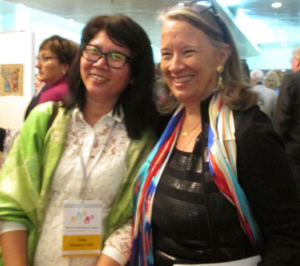
Ma Thida and Joanne Leedom-Ackerman at the PEN Congress in Bishkek, Kyrgyzstan in October 2014
For me, the outward facing Canadian Congress mirrored my own preparation for moving with my family to London three months later in January 1990. It was a fortuitous time to live in Europe as Eastern Europe was opening to the West. Six weeks after the PEN Congress, East Germany announced that its citizens were free to cross into the West, and the Berlin Wall began to crumble figuratively and literally as citizens used hammers and picks to knock down the looming concrete structure. In fall 1990, I took my sons, ages 10 and 12, to East Berlin, and we too climbed up on ladders with metal rods and knocked down the wall, chunks of which we still have.

Joanne and sons Elliot and Nate at the Berlin Wall, Fall 1990
At the Canadian Congress, PEN International’s Writers in Prison Committee (WiPC) Chair Thomas von Vegesack asked that a sub-committee be formed to assist in fundraising. Eight centers—Australian (Perth), Canadian, Swedish, Norwegian, West German, English, American and USA West agreed to help. Because I was moving to London where PEN International was headquartered, Thomas asked if I would head the effort. I told him I wasn’t able to do so but agreed to take on the interim position and help him find a chair and then agreed to take on the task of getting PEN International charitable tax status. I assumed the latter mission would be fairly straightforward, a matter of finding the right law firm to assist. Little did I know the complications of British charitable tax law. Eventually Graeme Gibson, president of PEN Canada, novelist and partner of Margaret Atwood, agreed to head the development effort.
After I arrived in London, I found a law firm. Charitable tax status would relieve PEN of tax bills it found hard to pay and also help with fundraising, but so far PEN had not been able to secure the charitable status. Thomas and I, along with the International Secretary Alexander Blokh, Treasurer Bill Barazetti and Administrative Secretary Elizabeth Paterson met frequently at the PEN International offices at the top of four (or was it five?) very steep flights of stairs in the Charterhouse Buildings where we worked on what turned out to be a two-year project that included the establishment of the International PEN Foundation. The Foundation was allowed to raise tax-exempt funds for the “charitable” work of PEN which could not include perceived “political” work, but only the “educational” aspects.
It took a young American who didn’t know it was impossible to do what we have not been able to do, Antonia Fraser said to me as she joined the first board of the International PEN Foundation in 1992. In a way she was right for I had no idea the complexity of British tax law, quite different than America’s. I wasn’t prepared for the sets and sets of documents and negotiations, the time required to set up a separate organization; on the other hand, the effort opened up the workings of PEN International to me and introduced me to friends I’ve maintained over the decades who also worked on the project. On the Foundation board with me were a majority of British citizens (and PEN members), including Antonia Fraser, Margaret Drabble, Buchi Emecheta, Andre Schiffrin, Christopher Sinclair-Stevenson and later Ronald Harwood as well as a few other international members, PEN’s International Secretary, Treasurer and the new PEN President Gyorgy Konrad.
Harold Pinter’s play Moonlight premiered as the first fundraising event of the International PEN Foundation on October 12, 1993 at the Almeida Theater. Dramatically, the lights of the theater burnt out just before the performance, and the play was performed by candlelight.
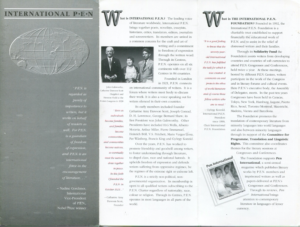
First International PEN and PEN Foundation brochure.
Next Installment: PEN Journey 5: PEN in London, Early 1990’s
Full Moon Over Tokyo
Flying west 15 hours I never saw the sun set, but in the evening, between the skyscrapers of Tokyo, I glimpsed the full moon I’d left the night before shimmering on the Potomac, the same full moon beaming down over China, Myanmar, and Vietnam. I found myself contemplating whether the writers in prison in those countries could also glimpse the luminous golden light from a corner of their prison cells. I was in Tokyo for PEN International’s 76th Congress.
Writers from 90 centers of PEN gathered to discuss “The Environment and Literature—What can words do?” and to commemorate the 50th Anniversary of PEN’s Writers in Prison Committee, that particular group of writers who advocate on behalf of colleagues imprisoned, threatened or killed for the expression of their ideas.
In its history, PEN International’s Writers in Prison Committee has been instrumental in getting the releases of such well known writers as Arthur Koestler, Wole Soyinka, Vaclav Havel as well as thousands of others in countries on every continent and from every political condition, from fascist regimes, communist regimes, marginal and faux democracies, wherever words were considered subversive and powerful enough to threaten. At the moment the most cases and the longest prison sentences for writers are in China, Myanmar, Vietnam and Iran, but writers are under threat in over 60 countries with the internet offering a new frontier for protection of free expression.
At the keynote ceremony of the PEN International Congress a play, Water Letters by Hisashi Inoue, dramatized the theme of the earth’s and mankind’s connectedness, especially through water. Human beings are largely made of water, and water—rivers, streams, oceans—links us all, the characters intoned. If the source of water is threatened in one area, there are repercussions in another. There is one earth, one people; the environment is in our hands.
The same can be said of freedom of expression. The 11-year imprisonment of Liu Xiaobo for urging democratic reform in China not only imprisons the man but the possibility of his next ideas. The imprisonment of writers in Myanmar and Vietnam, the more than 60 imprisoned writers, journalists, and bloggers in Iran affect the flow of ideas worldwide. The more than 50 journalists killed in Mexico chills freedom and undermines the rule of law beyond Mexico’s borders.
Yet ideas, like water, have a way of flowing around barriers and through bars and seep into the stream of thought if passed from one person to the other. And so writers outside prison pass on the work and writing of their colleagues.
Looking up at the moon, we contemplate the universe from the same point of focus and glimpse for a moment our connectedness.